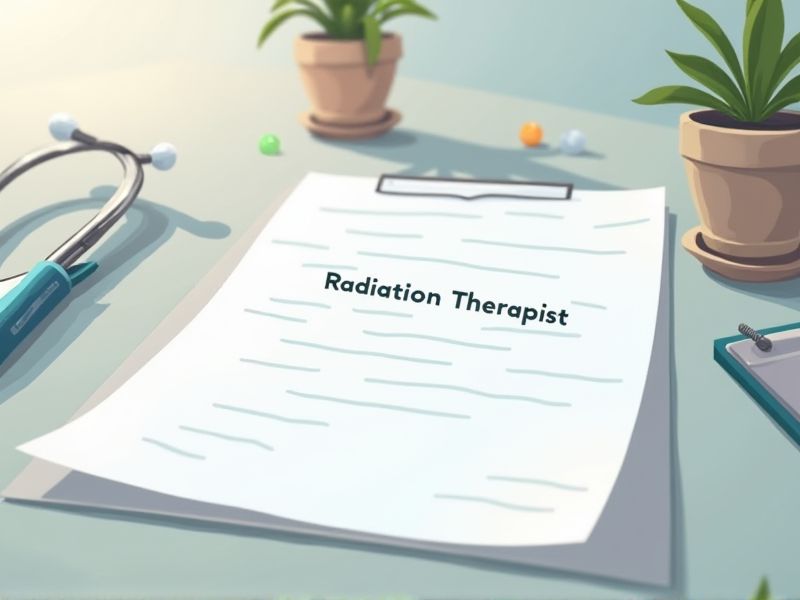
Radiation therapists play a critical role in cancer treatment by administering radiation to patients, necessitating a deep understanding of both technology and patient care. They must obtain specific certifications to ensure they are proficient in safely operating sophisticated radiation equipment and accurately interpreting treatment plans. These certifications validate their ability to minimize risks to patients while maximizing therapeutic outcomes. Essential certifications for radiation therapists include credentials like ARRT and state licensure.
ARRT Certification in Radiation Therapy
Certification from the ARRT ensures that radiation therapists meet standardized levels of professional competency, reducing the likelihood of errors in patient treatment. It supports patient safety by verifying that practitioners are knowledgeable about the latest technologies and protocols in radiation therapy. Many employers require ARRT certification as it signifies a commitment to maintaining quality care standards within the medical field. It often enhances career prospects because certification is recognized as a mark of excellence and dedication to continuous learning in the profession.
ARRT Special Procedures Certification
ARRT Special Procedures Certification ensures radiation therapists have expertise in advanced imaging techniques, enhancing patient care quality. Certification differentiates therapists in a competitive job market by demonstrating a commitment to professional development. Knowledge from certification can lead to improved accuracy in targeting treatment areas, reducing potential complications. Employers often prefer or require certified therapists to ensure adherence to industry standards and safety protocols.
CAMRT Certification in Therapeutic Radiography
CAMRT Certification in Therapeutic Radiography elevates a radiation therapist's credibility, ensuring high standards of care in a technologically advanced medical field. It equips professionals with the latest procedural knowledge and safety measures, crucial for patient safety during radiation treatments. The certification aligns with job market demands, often being a prerequisite for employment and career advancement in Canadian healthcare facilities. It fosters continuous professional development, helping therapists to keep pace with innovations and best practices within the profession.
Certified Medical Dosimetrist (CMD)
A Certified Medical Dosimetrist ensures precise calculation and planning of radiation doses, which directly improves patient treatment outcomes. Their expertise in creating effective treatment plans minimizes risk and maximizes the therapeutic effects, crucial for patient safety. CMDs work closely with radiation therapists, facilitating smooth coordination and accurate delivery of treatments. Their specialized knowledge enhances the radiation oncology team's capabilities, fostering a collaborative environment necessary for comprehensive cancer care.
NRC Radiation Safety Training Certification
Radiation therapists require the NRC Radiation Safety Training Certification because it ensures they understand how to minimize radiation exposure to patients and themselves, thus reducing potential health risks. This certification is necessary to comply with federal regulations that mandate specific safety standards for handling radioactive materials. Understanding radiation safety protocols is crucial for effectively administering treatments while maintaining a safe clinical environment. The certification helps build trust with patients, as it indicates that the therapist is equipped with the essential knowledge and skills for safe operation.
Radiation Safety Officer (RSO) Certification
The RSO certification equips a radiation therapist with the necessary knowledge to ensure the safe use and handling of radioactive materials, reducing the risk of accidental exposure. This certification is crucial for maintaining regulatory compliance with health and safety standards set by governing bodies. RSO-certified professionals demonstrate adherence to industry best practices, fostering trust among patients and colleagues. Through certification, radiation therapists gain expertise in emergency preparedness and response, enhancing the overall safety of treatment environments.
Basic Life Support (BLS) Certification
BLS certification equips radiation therapists with essential skills to manage cardiac and respiratory emergencies, which can occur unexpectedly in clinical settings. Compliance with healthcare regulations often mandates BLS training to ensure all staff can address critical situations safely. Certification enhances the therapist's ability to work collaboratively with medical teams during emergencies, promoting better patient outcomes. Employers prioritize hiring candidates with BLS certification, recognizing their preparedness and commitment to patient safety.
Advanced Cardiovascular Life Support (ACLS) Certification
Advanced Cardiovascular Life Support (ACLS) Certification is needed for radiation therapists due to the high risk of cardiac emergencies in patients undergoing radiation treatments. Radiation therapy can induce stress on the body's systems, potentially leading to acute medical situations requiring immediate intervention. A radiation therapist with ACLS training is better equipped to recognize and respond to arrhythmias or cardiac arrest, thereby increasing patient safety. In medical settings where collaboration among healthcare professionals is critical, having ACLS-certified staff ensures efficient and coordinated emergency response.
Cardiopulmonary Resuscitation (CPR) Certification
Obtaining CPR certification for radiation therapists enhances their ability to respond effectively to medical emergencies that could arise during treatment sessions. Radiation therapy can sometimes lead to adverse reactions, and having CPR training ensures therapists are prepared to offer immediate life-saving interventions. The certification fosters a safer environment for both patients and healthcare providers by equipping therapists with the skills needed for emergency response. Insurance requirements and regulatory standards often mandate CPR training to maintain safety and compliance in healthcare settings.
Quality Assurance in Radiation Oncology Certification
Quality Assurance in Radiation Oncology Certification enhances the skills of radiation therapists, ensuring they adhere to the highest standards of safety and precision in treatment delivery. With certified knowledge, therapists minimize exposure risks and improve patient outcomes by delivering accurate radiation dosages. Consistent certification requirements lead to standardized practice across the healthcare sector, reducing the potential for errors in treatment protocols. This certification fosters continuous professional development, allowing therapists to keep pace with technological advancements in oncology care.
Summary
When you, as a radiation therapist, earn additional certifications, you can anticipate increased job opportunities and potentially higher salary prospects. You may also gain specialized knowledge that enhances your ability to provide advanced patient care, improving treatment outcomes. Certification often leads to a higher level of professional credibility, which can boost your reputation in the medical community. As a result, your career trajectory may shift towards more leadership and educational roles within your field.
